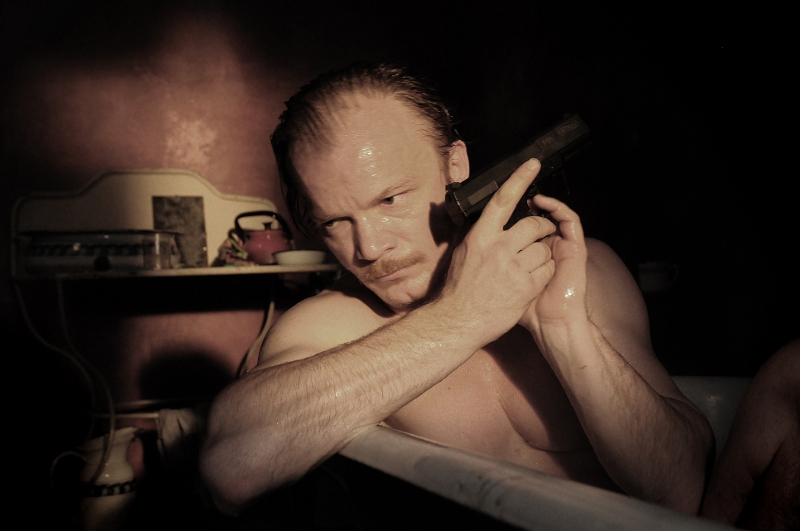 Eryk Lubos in Jan Jakub Kolski's "Zabić bobra", photo: Kino Świat.
Eryk Lubos in Jan Jakub Kolski's "Zabić bobra", photo: Kino Świat.
Eryk (played by Eryk Lubos) is going back to where he came from. The Iraq war veteran is returning to his abandoned family home to find peace and quiet. He is also preparing for an unofficial mission - a hostage rescue. His daily routine is interrupted by the appearance of Bezi (played by Agnieszka Pawełkiewicz), a teenager runaway. An erotic fascination develops between the couple of loners.
Again, Jan Jakub Kolski takes the viewer on a journey to his childhood, and again, the action takes place in the town of Popielawy. What is more - the main setting is a house that was rented by the grandparents of the director for several years. But this time Kolski's return to childhood is more than just a sentimental journey. The mythical Arcadia from "Zabić bobra" ("To Kill a Beaver") turns into a trap in which the director has to face his own fears.
Illuminated, mirthful shots are replaced by gloomy images. The filming of "Zabić bobra" ran hand in hand with a drama from the director's personal life. Right at the outset of the filming, Kolski's mother had to go to the hospital. While she died over a couple of months, she obliged her son to finish his film project. Life kept on interfering with art, constantly altering its course. Faced with death and loss, the way they appeared in the script, scenes lost their sense. This is how the story of a soldier suffering from PTSD transformed into a murky self-portrait of an artist facing his weaknesses, and talking about a doomed love and how to face one's own demons.
Over-the-top metaphorical scenes are replaced with realistic observations: images full of imperfections and lacking decorum. In "Tygodnik Powszechny" Kolski commented,
I have started to be afraid of metaphorical figures. There were once many of them in my films. The viewers would say: "Indeed, this world doesn't really exist, but it's so amiable and nice on the screen". I liked that a lot. Today when I see a poetic scene in a film that I accidentally missed, I cut it out.
The images in "Zabić bobra" are rough and shaky. It lacks the aesthetic pampering of Kolski's last films: "Wenecja" ("Venice") and "Jasminum". It is replaced with a delirious form. The effect is no accident, but the deliberate choice of a director who wanted to recreate a raw and anti-aesthetic world on the screen. Alongside the cinematographer Michał Pakulski, Kolski operated the camera as well. The duo was noticed by the jury of the 2012 International Film Festival of the Art of Cinematography Plus Camerimage (which takes place in Poland) where the film was named Best Polish Film for cinematography.
Presented at the 47th International Film Festival in Karlovy Vary, the film gained the praise of journalists who called it one of the event's most intriguing picks. On the occasion Eryk Lubos received the Award for Best Male Role. Handing the Crystal Globe to Lubos, Susan Sarandon confessed that she had not seen such a moving creation in the cinema for a long time. Interpreted by the Polish actor, the protagonist is a man lost in the whirl of his own paranoia - putting on a tough mask in front of the world and simultaneously fearing it.
Despite successes at festivals (Camerimage and Karlovy Vary International Film Festival), the film was absent from Polish cinemas for two years. In the meantime, American producers bought the rights to a remake. Allen Hughes, director of The Book of Eli and Broken City, will direct the Hollywood version of "Zabić bobra". The Polish distributors' fears are easy to comprehend because the film can be considered a betrayal of style committed by the director. Showing a doomed love and the turmoil of paranoia, Kolski created a delirious film which is well acted out but difficult to read.
- "Zabić bobra" ("To Kill a Beaver"), Poland 2012. Script and directing: Jan Jakub Kolski, cinematography: Michał Pakulski, music: Dariusz Górniok, editing: Piotr Kolski. Cast members: Eryk Lubos, Agnieszka Pawełkiewicz, Mariusz Bonaszewski, Marek Kasprzyk, Aleksandra Michael. Running time: 100 minutes. Distributor: Kino Świat. Premiering on the 21.03.2014.
Author: Bartosz Staszczyszyn, translator: Mai Jones Jeromski 21/03/2014